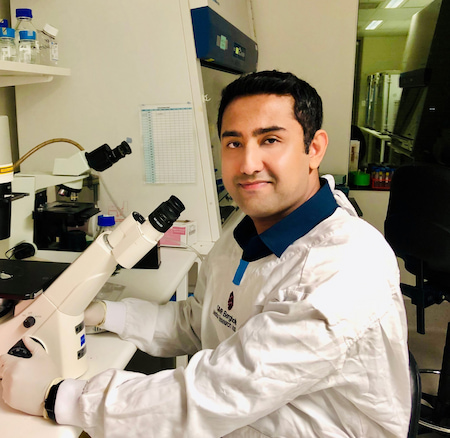Basit Salik: Targeting the cancer-immune crosstalk in AML

Acute myeloid leukaemia (AML) is an aggressive haematological malignancy where accumulation of immature myeloid blasts result in bone marrow failure. Over the last four decades, chemotherapy-directed management of AML patients has remained largely unchanged. While most patients achieve complete remission after chemotherapy, most patients with AML relapse and ultimately die of the disease.
A high relapse rate in AML suggests that current standard therapies do not target these highly self-renewing leukaemia cells and that immune subversion by the primary tumour leads to an ineffective anti-tumour response. Cancer cells, including leukaemias, can adapt to oncogenic and/or environmental stressors such as chemotherapy, hypoxia, and metabolic stress. Indeed, several stress-induced molecules augment pro-survival signalling and aggressiveness in cancer cells. By contrast, either by direct recognition of stress-induced molecules on cancer cells or by exposure to environmental stress factors, immune cells also undergo functional impairment.
Basit and team will investigate biological pathways that regulate cancer cell-intrinsic adaptation/aggressiveness as well as immune dysfunction by utilising patient samples and pre-clinical models of AML. The team is hopeful that this research will lead to improved therapeutics that can effectively inhibit leukaemia growth with the potential of harnessing anti-leukaemia immune responses for durable disease control.
About Basit
Basit is pursuing a career in blood cancer immunology. He graduated with Honours from the University of Queensland and received research training in leukaemia biology at the Children’s Cancer Institute, University of New South Wales. Basit is currently undertaking research in cancer immunology and will commence the Doctor of Philosophy (PhD) program at the QIMR Berghofer Medical Research Institute (QIMRB) in 2021. His project will focus on developing therapeutics that target both cancer cell-intrinsic and immune-mediated evasion mechanisms in acute myeloid leukaemia (AML).
This PhD scholarship is kindly supported by Brydens Lawyers.
PhD scholarships are co-funded by the Leukaemia Foundation and the Haematology Society of Australia and New Zealand (HSANZ).
Last updated on January 30th, 2023
Developed by the Leukaemia Foundation in consultation with people living with a blood cancer, Leukaemia Foundation support staff, haematology nursing staff and/or Australian clinical haematologists. This content is provided for information purposes only and we urge you to always seek advice from a registered health care professional for diagnosis, treatment and answers to your medical questions, including the suitability of a particular therapy, service, product or treatment in your circumstances. The Leukaemia Foundation shall not bear any liability for any person relying on the materials contained on this website.